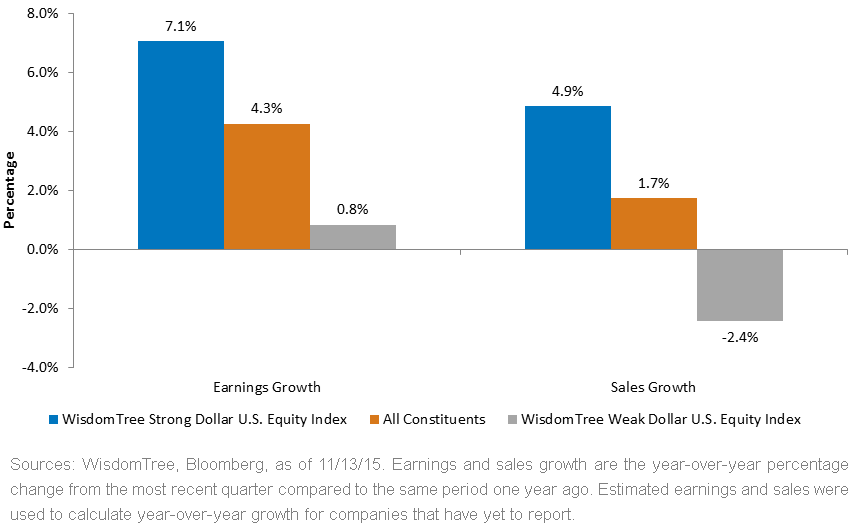At WisdomTree, we continue to believe one of the most important themes impacting the global markets has been the strengthening U.S. dollar—and this is a trend we expect to continue for some time. As a result of the recent dollar strength, many U.S. multinationals with global revenue streams have reported currency headwinds as part of their earnings statements over the past year. This has hurt their performance compared to European and Japanese exporters, who have benefited from the weakening of the yen and the euro, respectively, against the U.S. dollar. This relative performance advantage is no surprise to us, because our research shows that these foreign markets actually performed better when their home currencies depreciated than when they appreciated.
1 Given this historical relationship and relative
valuations, we continue to advocate for Japanese and eurozone exporters. But how should investors position their U.S. allocations?
U.S. Corporations Continue to Warn about Dollar Strength
“Sales by U.S. companies were $26.4 billion in the fiscal nine months of 2015, which represented an increase of 0.8% as compared to the prior year,” Johnson & Johnson reported. “Sales by international companies were $25.9 billion, a decline of 13.5%, including operational growth of 1.1%, offset by a negative currency impact of 14.6% as compared to the fiscal nine months sales of 2014.”
2
The Coca-Cola Company reported that over the most recent three months, “fluctuations in foreign currency exchange rates decreased our consolidated net operating revenues by 8 percent. This unfavorable impact was primarily due to a stronger U.S. dollar compared to certain foreign currencies, including the South African rand, euro, U.K. pound sterling, Brazilian real, Mexican peso, Australian dollar and Japanese yen, which had an unfavorable impact on our Eurasia and Africa, Europe, Latin America, Asia Pacific and Bottling Investments operating segments.”
3
Determining Your Dollar Sensitivity
WisdomTree believes currency sensitivity is an important factor that will continue to impact returns going forward, so to monitor the performance of this new factor, WisdomTree has created two new rules-based Indexes:
•
The WisdomTree Strong Dollar U.S. Equity Index (WTUSSD)—This Index selects companies that generate more than 80% of their revenue from within the U.S. and then tilts its weight toward stocks whose returns have a higher correlation to the returns of the U.S. dollar.
•
The WisdomTree Weak Dollar U.S. Equity Index (WTUSWD)—This Index selects companies that generate more than 40% of their revenue from outside the U.S. and then tilts its weight toward stocks whose returns have a lower correlation to the returns of the U.S. dollar.
Since the inception of these Indexes, the U.S. dollar has strengthened 2.95% against a diversified basket of developed and emerging market currencies, leading to a performance advantage of 1.72% for WTUSSD compared to WTUSWD.
4 To try to understand what is behind this performance difference, we chart the
median earnings and sales growth for the most recent quarter compared to the same reporting quarter one year ago, for both Indexes and the median for the entire universe.
Year-over-Year Median Earnings and Sales Growth

•
Strong Dollar Companies Displayed Higher Growth—The median earnings and sales growth for constituents of WTUSSD was more than 6% and 7% higher, respectively, compared to constituents of WTUSWD. We believe constituents of WTUSSD, or companies that generate more than 80% of their revenue domestically, tend to be less impacted by a strong-dollar environment—they aren’t focused on selling their goods and services abroad, and their import costs decrease with the rising purchasing power of the dollar.
How Long Can This Persist?
We have recently published a research paper,
What a Rising U.S. Dollar Means for U.S. Equities White Paper, in which we illustrated the declining competitiveness of U.S. exports by graphing a ratio of exports of the U.S. economy over imports. As the U.S. dollar strengthened, the ratio of exports over imports weakened. Historically, we found that the impact can have a lag of around 36 months, so if history is any guide, we may not have seen the worst impact on exporters yet. At WisdomTree, our base case is still for a strengthening U.S. dollar, which may provide a continued headwind to U.S. multinationals with global revenue, but, depending on investors’ views, they can use the above Indexes to track the performance of either basket.
1Sources: WisdomTree, Bloomberg.
2Source: Johnson & Johnson quarterly earnings report, 10/30/15. Johnson & Johnson had a 1.21% weight in the
WisdomTree Weak Dollar U.S. Equity Index as of 11/13/15.
3Source: The Coca-Cola Company quarterly earnings report, 10/28/15. The Coca-Cola Company had a 0.71% weight in the WisdomTree Weak Dollar U.S. Equity Index as of 11/13/15.
4Sources: WisdomTree, Bloomberg, 5/29/15–11/13/15. U.S. dollar performance against a diversified basket of developed and emerging currencies is represented by the
Bloomberg Dollar Total Return Index.
Important Risks Related to this Article
Investments in currency involve additional special risks, such as credit risk and interest rate fluctuations.


 • Strong Dollar Companies Displayed Higher Growth—The median earnings and sales growth for constituents of WTUSSD was more than 6% and 7% higher, respectively, compared to constituents of WTUSWD. We believe constituents of WTUSSD, or companies that generate more than 80% of their revenue domestically, tend to be less impacted by a strong-dollar environment—they aren’t focused on selling their goods and services abroad, and their import costs decrease with the rising purchasing power of the dollar.
How Long Can This Persist?
We have recently published a research paper, What a Rising U.S. Dollar Means for U.S. Equities White Paper, in which we illustrated the declining competitiveness of U.S. exports by graphing a ratio of exports of the U.S. economy over imports. As the U.S. dollar strengthened, the ratio of exports over imports weakened. Historically, we found that the impact can have a lag of around 36 months, so if history is any guide, we may not have seen the worst impact on exporters yet. At WisdomTree, our base case is still for a strengthening U.S. dollar, which may provide a continued headwind to U.S. multinationals with global revenue, but, depending on investors’ views, they can use the above Indexes to track the performance of either basket.
1Sources: WisdomTree, Bloomberg.
2Source: Johnson & Johnson quarterly earnings report, 10/30/15. Johnson & Johnson had a 1.21% weight in the WisdomTree Weak Dollar U.S. Equity Index as of 11/13/15.
3Source: The Coca-Cola Company quarterly earnings report, 10/28/15. The Coca-Cola Company had a 0.71% weight in the WisdomTree Weak Dollar U.S. Equity Index as of 11/13/15.
4Sources: WisdomTree, Bloomberg, 5/29/15–11/13/15. U.S. dollar performance against a diversified basket of developed and emerging currencies is represented by the Bloomberg Dollar Total Return Index.
• Strong Dollar Companies Displayed Higher Growth—The median earnings and sales growth for constituents of WTUSSD was more than 6% and 7% higher, respectively, compared to constituents of WTUSWD. We believe constituents of WTUSSD, or companies that generate more than 80% of their revenue domestically, tend to be less impacted by a strong-dollar environment—they aren’t focused on selling their goods and services abroad, and their import costs decrease with the rising purchasing power of the dollar.
How Long Can This Persist?
We have recently published a research paper, What a Rising U.S. Dollar Means for U.S. Equities White Paper, in which we illustrated the declining competitiveness of U.S. exports by graphing a ratio of exports of the U.S. economy over imports. As the U.S. dollar strengthened, the ratio of exports over imports weakened. Historically, we found that the impact can have a lag of around 36 months, so if history is any guide, we may not have seen the worst impact on exporters yet. At WisdomTree, our base case is still for a strengthening U.S. dollar, which may provide a continued headwind to U.S. multinationals with global revenue, but, depending on investors’ views, they can use the above Indexes to track the performance of either basket.
1Sources: WisdomTree, Bloomberg.
2Source: Johnson & Johnson quarterly earnings report, 10/30/15. Johnson & Johnson had a 1.21% weight in the WisdomTree Weak Dollar U.S. Equity Index as of 11/13/15.
3Source: The Coca-Cola Company quarterly earnings report, 10/28/15. The Coca-Cola Company had a 0.71% weight in the WisdomTree Weak Dollar U.S. Equity Index as of 11/13/15.
4Sources: WisdomTree, Bloomberg, 5/29/15–11/13/15. U.S. dollar performance against a diversified basket of developed and emerging currencies is represented by the Bloomberg Dollar Total Return Index.


